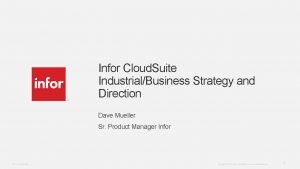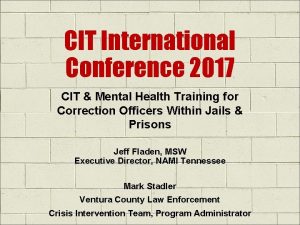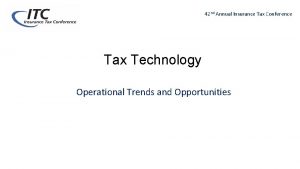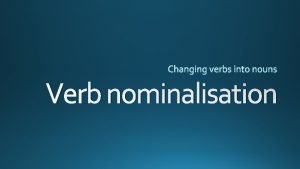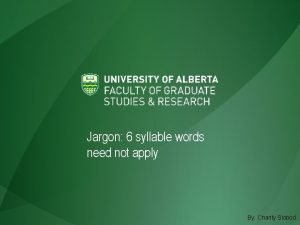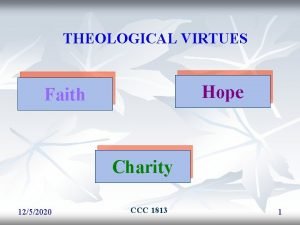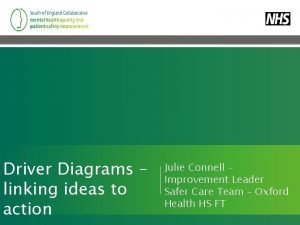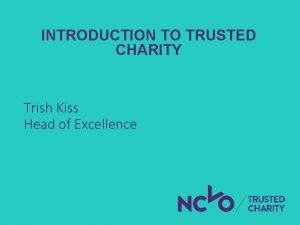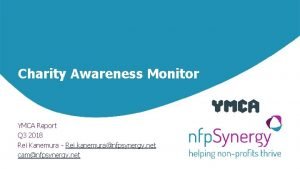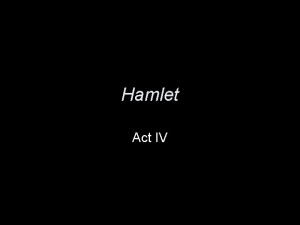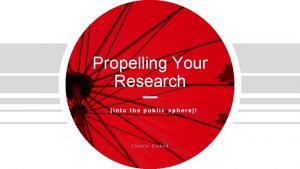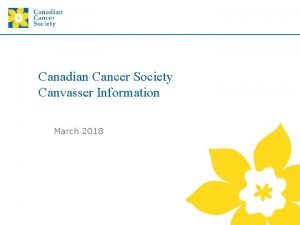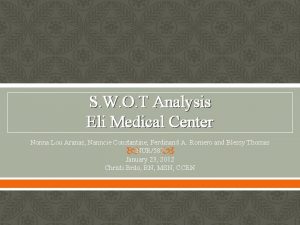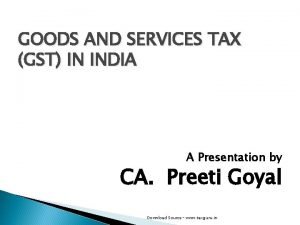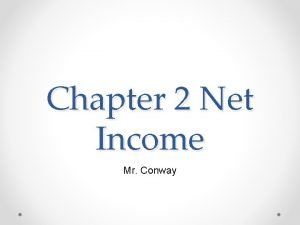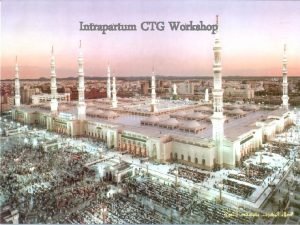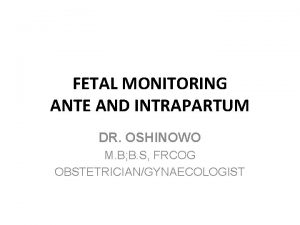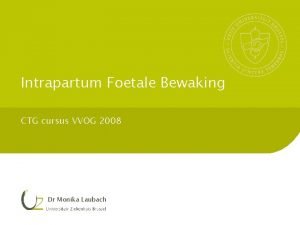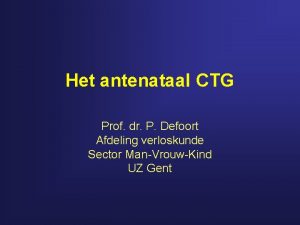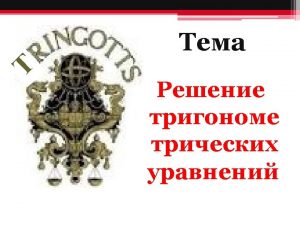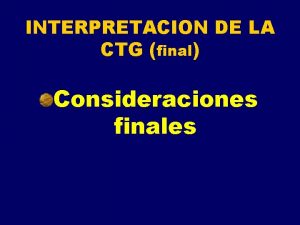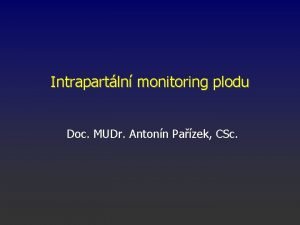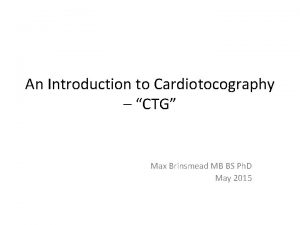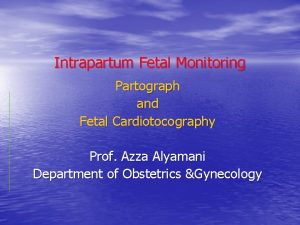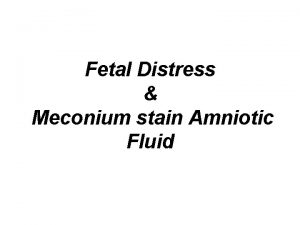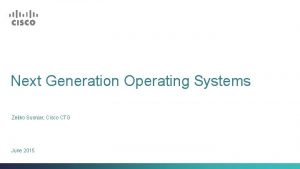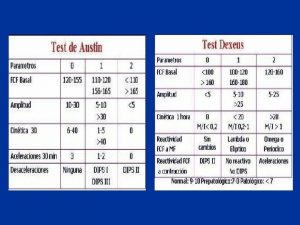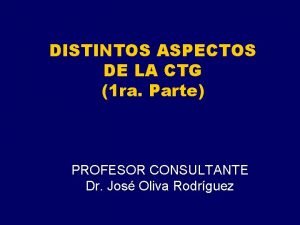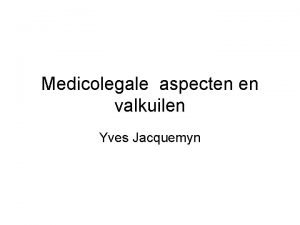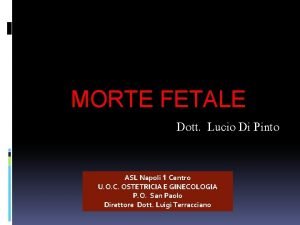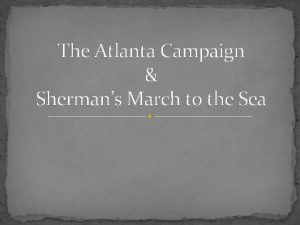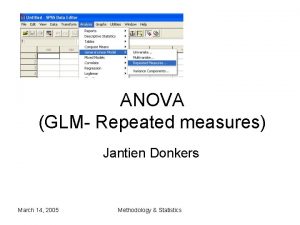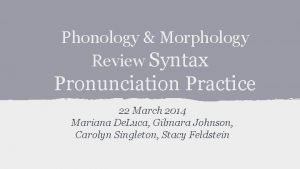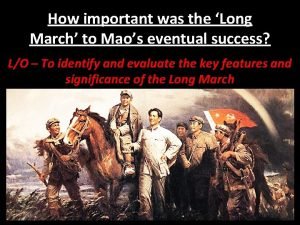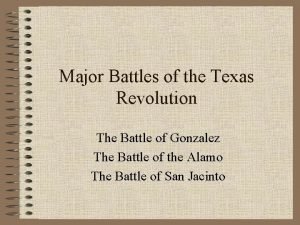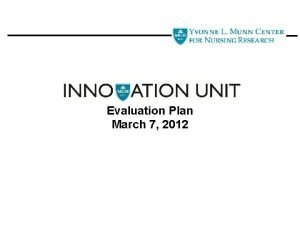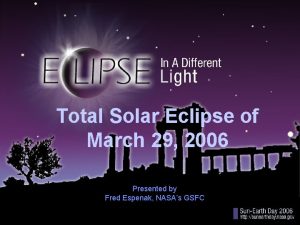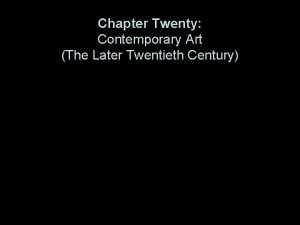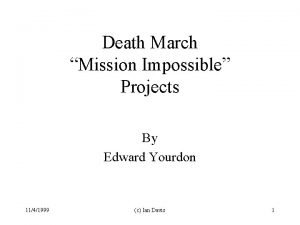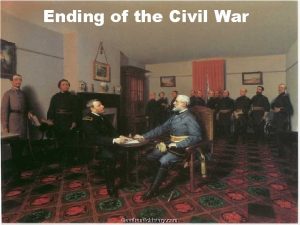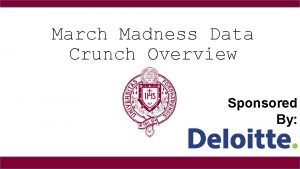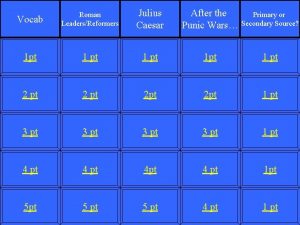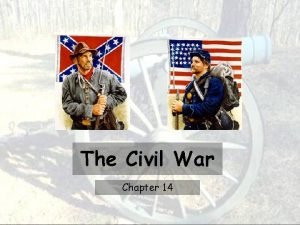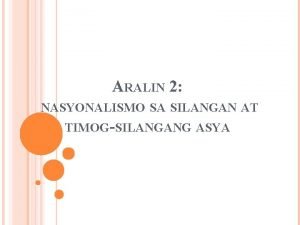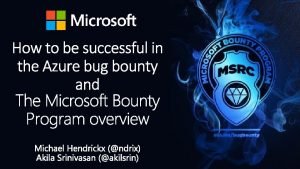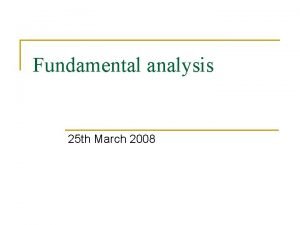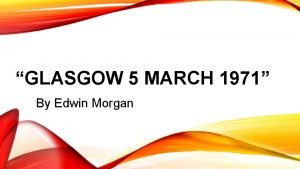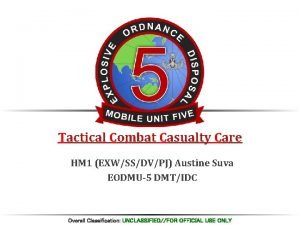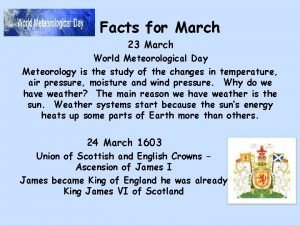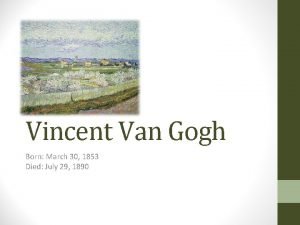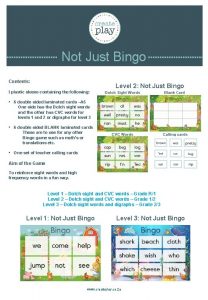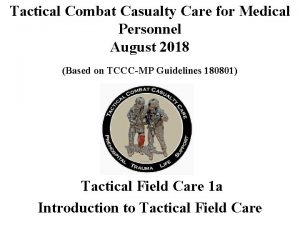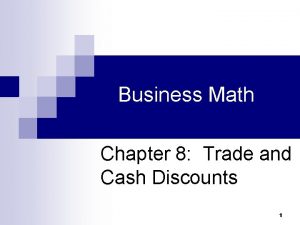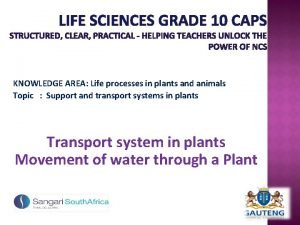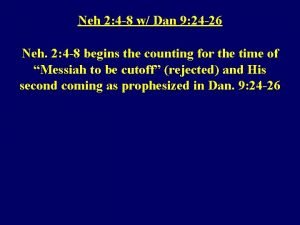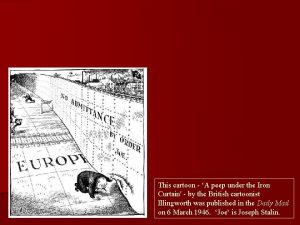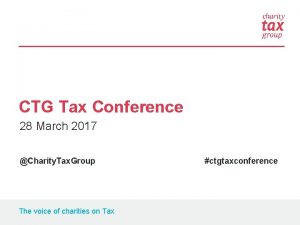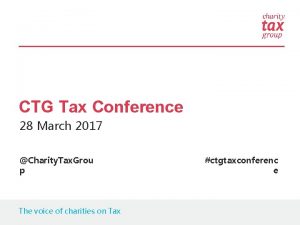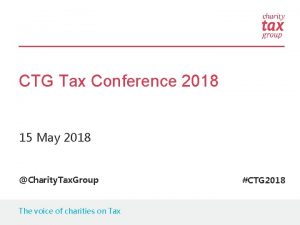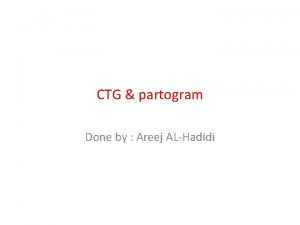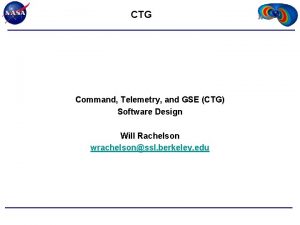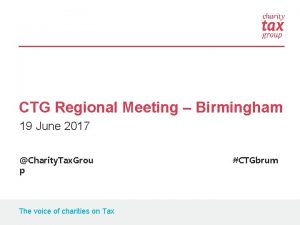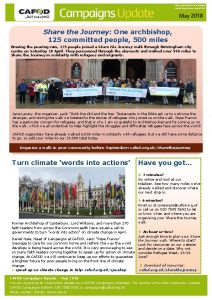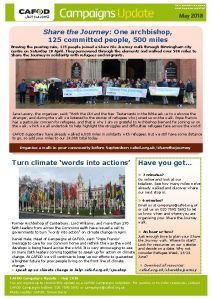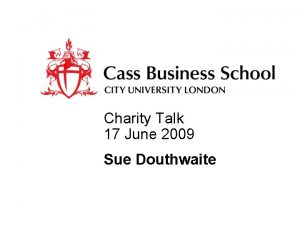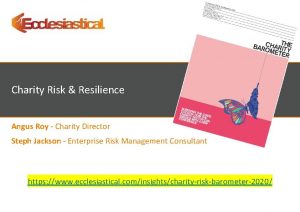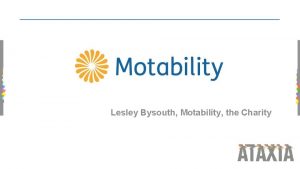CTG Tax Conference 28 March 2017 Charity Tax















































































































- Slides: 111

CTG Tax Conference 28 March 2017 @Charity. Tax. Group The voice of charities on Tax #ctgtaxconferenc e

Charities and tax A view from the Government Jane Ellison MP, Financial Secretary to the Treasury The voice of charities on Tax

Topical VAT updates Graham Elliott, CTG Technical Adviser The voice of charities on Tax

Topical VAT update § VAT Expert Group § Representation on the JVCC § Work with HMRC to update grants/contracts and sponsorship guidance notes § VAT case law tracker The voice of charities on Tax

VAT cases § Longridge on the Thames and Gravel Road Records § Adecco § British Film Institute § Aviva and DNB Banka § Durham Cathedral § Newcastle University § Halle Concerts Society § Taylor Wimpey The voice of charities on Tax

Longridge and Gravel Road § Defined ‘economic activity’ for purposes of Relevant Charitable Purpose (RCP) § Did not produce favourable outcome for charity § ‘Lord Fisher’ tests not approved, and difficult now to use § Old cases of Yarbrough and St Pauls now in doubt § Possible continued application to small scale operations (see Gravel Road Studios) The voice of charities on Tax

Adecco § Whether self employed temp workers subject to VAT on wage element § Appeal from First Tribunal to Upper Tribunal § Decided on facts and on the contractual terms § Held that Adecco made full supply so VAT applies to wage element § Not clear whether to be appealed further § Creates significant tax imbalance in different ‘employment’ arrangements The voice of charities on Tax

British Film Institute § Relates to culture and what can be included for the exemption § CJEU decided that the UK law ‘list’ of favoured activity is compatible with EU law § Hence cinema cannot be regarded as ‘culture’ § Same applies to others, e. g. botanical gardens § Perhaps list is too narrow in any case… The voice of charities on Tax

Cost sharing exemption § Advocate General Opinion in Aviva and DNB Banka § If followed by CJEU will confirm very narrow basis of CSE § AG says a separate ‘VAT entity’ needed for CSE supplies § AG says no margin applicable to cost recharges even as low as 5% § Surprising view that final non-taxable activity cannot be a finance exemption The voice of charities on Tax

Sveda revisited § Durham Cathedral tribunal case § Based on Sveda § Does not deny that Sveda applies to charities § No sign of HMRC policy on Sveda application to charities The voice of charities on Tax

Imported agency services § Whether services of overseas based agents to find students are subject to reverse charge § Newcastle University case, held that the supply was made to the UK university and not to the students § Therefore not third party consideration for supply to student § Large VAT liability on reverse charge § Question – could ‘examination service’ exemption apply instead? The voice of charities on Tax

Philanthropic exemption § Halle Concerts Society § Meaning of ‘philanthropic’ § HMRC’s restrictive view versus the wider possible view The voice of charities on Tax

Blocking order § Whether the rule under which the VAT on white goods, carpets, etc in new residential buildings cannot be claimed is wrong in EU law § Taylor Wimpey appealed to Upper Tribunal § Appeal dismissed – Blocking Order is good law § Relevant to charities developing social housing for sale The voice of charities on Tax

Other VAT updates § University of Cambridge case on VAT and investment management fees delayed § Brockenhurst – AG Opinion published § Group registration review § Policy concerning pre-registration input tax § Direct mail – feedback requested on HMRC assessments The voice of charities on Tax

Gift Aid practical issues Steve Carroll, HMRC The voice of charities on Tax

Steve Carroll HMRC (Specialist Personal Tax) Charities Savings & International

What will we talk about today? 1. HMRC’s Donor Education Programme. 2. Recent changes to the on-line donation process and the reason for those changes. Protective marking – Unclassified, Protect, Restricted (delete as required)

Why the change? ation Declar Checks by HMRC have found that increasing numbers of GA donations do in fact not qualify for gift aid. Previously HMRC have simply asked are you a UK taxpayer via the Gift Aid Declaration. Recent research has highlighted a high number of non-eligible donations have and in some cases still are passing through on-line platforms without any verification checks by either HMRC or the platform provider themselves. This had resulted in up to 1 million GBP in Gift Aid being paid out every month when none was due. Protective marking – Unclassified, Protect, Restricted (delete as required)

Gift Aid declaration Declar Via a Declaration by the individual confirming that; “I am a UK taxpayer and understand that if I pay less Income Tax and/or Capital gains tax than the amount of Gift Aid claimed on all my donations in that tax year it is my responsibility to pay any difference. ” Protective marking – Unclassified, Protect, Restricted (delete as required)

The Gift Aid Eligibility Test Ø HMRC recognised that for improvements to be made education to the donor would need to be increased. With this in mind we have worked closely with the larger on-line providers encouraging them to improve education via their fundraising packs and by introducing an on-line gift aid eligibility test. Ø We have improved the Guidance on certain situations which may apply when giving on-line and this can be found at Chapter 3. 44 on the detailed guidance notes. Ø We accept however that there is little chance of this advice being read by an individual immediately prior to a donation being made. Ø So we are working with the On-Line providers and the Charities themselves to try an improve education with the aim that Gift Aid is claimed only when it is due. Protective marking – Unclassified, Protect, Restricted (delete as required)

Gift Aid knowledge quiz QUESTION 1 A fundraiser who is a UK tax payer collects money from office colleagues and in his local pub cover a two month period and banks all of the money in his own bank account. He then uploads the total donations part of which is his own donation by using his own debit card. When donating on-line he confirms he is a UK tax payer and completes the declaration to confirm this. Can he make this payment as a Gift Aid payment? Protective marking – Unclassified, Protect, Restricted (delete as required)

Answer No - Gift Aid can be claimed. The fundraiser is simply passing on donations he has collected from various different sources. He only way he can claim gift aid on his own donation is if he splits that out by making a separate donation. Protective marking – Unclassified, Protect, Restricted (delete as required)

Question 2 Kate organises a ‘Fun Day and exhibition match’ at her local rugby club in memory of her late father. Entry is by ticket only, and other funds are raised through a raffle, tombola, fairground rides, bouncy castle and free-will donations, £ 1, 000 is collected from all sources. Kate then pays this to her chosen charity using her social giving account and includes the message ‘In loving memory of my father, Frank’. Can he make this payment as a Gift Aid payment? Protective marking – Unclassified, Protect, Restricted (delete as required)

Answer No - Gift Aid can be claimed. Money raised from the sale of raffle tickets, fairground rides and ticket sales are not eligible Gift Aid payments Ø Advice should be given in any fundraiser hand-out that all of the above cannot attract gift aid. Ø If the event ticket is free and a free will donation is made then this can be gift aided only if the Gift Aid Declaration is made by the person making the free –will donation. Not if he or she passes the money to a third party who then uploads the donation. Ø If an individual collects the full name and address of the individuals that made the free will donations and then passes the list to the charity along with a cheque for the donations collected then the charity themselves can claim gift aid by attaching the names and address to their own gift aid schedule when making a claim direct to HMRC. Protective marking – Unclassified, Protect, Restricted (delete as required)

Donor Education & Confirmation So this is what HMRC are looking to encourage all charities to do. Improve education. HMRC have worked closely with all of the large on-line platform providers over the last twelve months and if you make a donation via one of those sites you will now see an additional step in the donation process. These are 3 questions that should be answered by donors or, Donors should be asked to confirm 3 statements apply to them; Protective marking – Unclassified, Protect, Restricted (delete as required)

Confirmation Statements 1. I am donating my own money and the funds have not come from anyone else including family members or from an office or bucket collection 2. The money I am donating is not the proceeds from sales of goods or services or the sale of tickets 3. I have not received something in return for this donation such as an entry ticket to an event or a raffle ticket. There can be slight variations to the on-line advice but the overall message must be the same. Only freewill donations made by the individual are eligible Gift Aid donations subject to the individual being a UK tax payer. In the past nobody has ever thought beyond the statement ‘Are you a UK taxpayer’. Protective marking – Unclassified, Protect, Restricted (delete as required)

Important advice- The Christmas Card Scenario When we talk about family and friends we are not looking to disallow Gift Aid claimed by an individual made on behalf of their and their partner’s behalf or of immediate family members. So when Steve Carroll makes a donation of £ 20 and adds his wife's and children’s names to the good will message on the fundraising page we assume that the £ 20 has come from Steve’s own money and he has merely added immediate family members just as you would on a Christmas card. HMRC have given clear guidance to the larger platform providers that this type of donation can qualify for gift aid. But it does not extend to the broader family such as Aunts and Uncles Grandparents etc. Protective marking – Unclassified, Protect, Restricted (delete as required)

Next Steps HMRC are in regular contact with the on-line providers sharing best practise and one on-line provider is it the process of implementing an additional validation check by asking an additional opening question ‘Are you donating your own money’ This is of high importance as data held indicates that a high percentage of the ineligible claims to gift aid are made by the fundraiser uploading funds collected via third parties to his/her own web page. Protective marking – Unclassified, Protect, Restricted (delete as required)

Further Steps It is not possible for HMRC to review each and every Charity platform and their fundraising packages so I am asking all charities to have a look at their own online services and their hand-outs and look to see what improvements can be made to provide better education. HMRC have recently carried out joint consultation with one of the UK’s larger charities and I am offering the same service and support to any charity who is willing to implement the recommendations we have talked about today. In addition to implementing an ‘Eligibility Test’ look to provide advice via the fundraising packs as quite a number of the recommended fund raising ideas involve non-qualifying events such as bake sales sweepstakes etc. Protective marking – Unclassified, Protect, Restricted (delete as required)

HMRC guidance on digital giving & social giving accounts In April 2016, HMRC added a new section to its Detailed Guidance Notes for Charities Chapter 3 – Gift Aid now includes section 3. 44 – ‘Digital giving & social giving accounts Protective marking – Unclassified, Protect, Restricted (delete as required)

Common Problems 1. Wrong Authorised Official/Agent/Nominee Please remember to advise HMRC each time there is a change via the form CHV 1. 2. Claiming excessive GASDS There annual limits of £ 5, 000 up to 5 April 16 and £ 8, 000 from 6 April 2016. If you do collect donations in excess of these figures do not reflect this in your claim. Keep within the appropriate maximum as otherwise your claim will be delayed. 3. Out of date GASDs Claims Remember that GASDs operates a tax year basis not an account year. Protective marking – Unclassified, Protect, Restricted (delete as required) HMRC NL Standard | 05/08/2013 | 31

Common Problems Errors completing a paper claim form • The form is scanned and read electronically. Do not put lines through boxes or ‘N/A’. The guidance notes advise that these boxes should be left blank • Additional correspondence is sometimes included –The guidance notes ask charities not include additional correspondence • ‘Aggregated donation’ box ticked as well as the name of the donor. Charities should not tick ‘aggregated’ when they have a regular donor – just the name address, date of donation and amount will do as per guidance notes • Missing information. The forms are first sent to HMRC’s scanning office. Forms with errors are then extracted and sent to the Outreach team which can cause a delay in repayments • Non-Qualifying donations –Out of date or company donations Protective marking – Unclassified, Protect, Restricted (delete as required) HMRC NL Standard | 05/08/2013 | 32

Contacts; Steve Carroll---- Steven. Carroll@hmrc. gsi. gov. uk---03000546552 Protective marking – Unclassified, Protect, Restricted (delete as required)

Brexit + EC/OTS VAT reviews Dermot Rafferty, EY Luigi Lungarella, PKF Littlejohn John Hemming, CTG Chairman The voice of charities on Tax

EU Referendum: Six months on Brexit – Tax implications

Where are we today? Page 36

Brexit – HMRC position ► HMRC has set up a cross departmental team - the EU Transition Unit (EUTU) to respond to the vote to leave the EU. This is part of HMRC’s Customer Strategy and Tax Design group. ► The EUTU liaises with the Department for Exiting the EU and the Department for International Trade. ► HMRC and HM Treasury carrying out review of possible implications and options. ► We have ongoing and regular dialogue. Page 37

Post Brexit uncertainty What trade deal will the UK strike with the EU? How would new tariffs impact my supply chain? What will happen to our share price? How will the legal/regulatory environment change? What will happen to exchange rates? Will we need new systems and processes? What will happen with the political situation? What will happen to exchange rates? What will happen to UK tax rates? Will we able to move our labour force around? What will happen to interest rates? Risk of Activity Paralysis Page 38 Is capital available for borrowing?

Three questions for most businesses 1 3 What are the likely impacts and opportunities for our business from a changing UK economy? Evolve Plan 2 What should we be doing now? Act Page 39 How should our business change as a result?

Brexit – How could the UK exit? What is planned? ► Negotiated withdrawal under Article 50 of the Treaty of Lisbon ► Notice in March 2017? ► Great Repeal Bill ► Repeal of European Communities Act 1972 ► Incorporate EU law into UK law Constitutional questions ► Devolved assemblies: consent vs consultations ► Does Parliament vote on Article 50 notice? ► Is Article 50 reversible? ► Does the exit agreement cover UK arrangements with EU post Brexit? ► Is it a mixed agreement? Page 40 Article 50 1. Any MS may decide to withdraw from the Union … 2. A MS which decides to withdraw shall notify the European Council of its intention. … the Union shall negotiate and conclude an agreement with that State, setting out the arrangements for its withdrawal, taking account of the framework for its future relationship with the Union. … It shall be concluded on behalf of the Union by the Council, acting by a qualified majority, after obtaining the consent of the European Parliament. 3. The Treaties shall cease to apply to the State in question from the date of entry into force of the withdrawal agreement or, failing that, two years after the notification referred to in paragraph 2, unless the European Council, in agreement with the MS concerned, unanimously decides to extend this period. 4. For the purposes of paragraphs 2 and 3, the member of the European Council or of the Council representing the withdrawing MS shall not participate in the discussions of the European Council or in decisions concerning it. 5. If a State which has withdrawn from the Union asks to rejoin, its request shall be subject to the procedure referred to in Article 49.

Article 50: Potential timeline ► ► Once notice given, negotiations start and clock is running – when to give notice? Government committed to March 2017 at the latest. Treaty provides for two years could be shorter if agreed or longer if extended by unanimity June 2019 Apr/May 2017 13 Jul 2016 New UK Prime Minister French Presidential Election Notice March 2017 Page 41 Aug-Oct 2017 German Federal Election EU Parliament Elections UK leaves EU March 2019?

Brexit – Does the EEA position need to be addressed? What is the issue? ► Does triggering withdrawal under Article 50 of the Treaty of Lisbon automatically mean that the UK leaves the EEA? ► Is the UK a member of the EEA in its own Article 127 Each Contracting Party may withdraw from this Agreement provided it gives at least twelve months' notice in writing to the other Contracting Parties. Immediately after the notification of the intended withdrawal, the other Contracting Parties shall convene a diplomatic conference in order to envisage the necessary modifications to bring to the Agreement. right or only as a member of the EU? Constitutional questions ► Can the UK choose to benefit from the EEA agreement by not giving notice to leave (as opposed to having to apply) ► Does Parliament need to vote on triggering an Article 127 notice, if it is applicable? ► Judicial review application to start on 19 January arguing Parliament must vote on grounds that Article 127 was not an issue in the referendum Page 42 Transitional stage Membership of the EEA may provide a way of transitioning out of the EU. This may be particularly useful in areas such as social security. However, membership of the EEA unlikely to be a long-term solution.

Brexit – Need for transitional arrangements ► Commons Treasury Committee has issued a call for written submissions on ‘transitional arrangements’. ► Transitional arrangements refer to any arrangement that takes effect between the point at which the UK formally leaves the EU and the point at which the UK's final, settled relationship with the EU becomes effective. ► EU Lords Committee report of 13 December 2016 recommends that the Government should establish a clear ‘game plan’ for a transitional arrangement at the outset of negotiations under Article 50 ► Chancellor appeared to give his support to the need for such arrangements in his appearance before the Treasury Committee on 12 December 2016 ► However, the ‘Brexit Secretary’ David Davis would accept such arrangements "if it's necessary and only if it's necessary". ► And Guy Verhofstadt, the European Parliament's chief Brexit negotiator, has said in reply that any transitional arrangement should have a strict time limit Page 43

Soft or hard Brexit ► Soft ► ► Join EEA like Norway Access to single market ► ► ► ► Page 44 ► Customs union? Non tariff barriers? Able to negotiate free trade agreements? Some restrictions on EU workers Contribution to EU budget No say in EU rule making Possible half way house to full exit Hard ► ► ► ► Leave EU Trade on WTO rules like US, Japan, China Free trade agreement with EU like Korea Able to negotiate free trade agreements Restrictions on EU workers No contribution to EU budget No say in rule making

Risks and opportunities § Wider benefits of EU membership § Opportunities for reform § Priorities for the charity sector § Impact of case law of the CJEU § Divergence in UK VAT law post Brexit § Understanding the landscape The voice of charities on Tax

VAT review – European Commission § Consultation closed 20 March 2017 § EC consulted on two options for permanent VAT system: 1. keep standard rate at 15% and regularly update the list of goods and services eligible for reduced/zero rates 2. remove the minimum rate of 15% and abolish the list of reduced/zero rates, granting greater discretion for Member States in fixing their own VAT rates The voice of charities on Tax

VAT review – European Commission § CTG led formulation of ECCVAT response, highlighting continuing difficulties of VAT system for charities § Welcomed flexibility of option 2, noting Governments better able to address VAT distortions if unrestricted by current need for unanimity for amending VAT rules § BUT noted need for appropriate safeguards to ensure that recognition for items of social benefit continues § Option 1 - the prudent approach? § Interaction with the Commission’s Action Plan on VAT The voice of charities on Tax

Extension of reduced VAT rates to epublications § Hard copies vs e-publications § Consultation on reduced VAT rates § December 2016 European Commission developments § Interaction with Brexit § Amendment of Directive 2006/112/EC - ECOFIN debate § EU Member States discretion § Rzecznik Praw Obywatelskich ECJ Judgment The voice of charities on Tax

VAT review – Office of Tax Simplification § Report published 7 March 2017, highlighting key areas of complexity and calling for ideas for future system § Areas where simplification is being considered include charities – OTS aware that since VAT rules introduced, size and diversity of the charity sector has increased The voice of charities on Tax

VAT review – Office of Tax Simplification § CTG asked to respond on key focus areas: § Identify the implications of a high registration threshold § Highlight multiple rates as a cause of complexity § Consider possibility of simplifications to partial exemption, option to tax and capital goods scheme § Look at viability of Special Accounting Schemes § Assess VAT implications of MTD agenda The voice of charities on Tax

Topical Tax Developments Karen Atkinson, City of London Corporation Justin Bevan, Oxfam John Hemming, CTG Chairman The voice of charities on Tax

Apprenticeship Levy - Payment § Collection via PAYE from April 2017 (next month!) § Levy set at 0. 5% of employer’s paybill § £ 15 k allowance means only annual paybills in excess of £ 3 m are affected (joint paybill for groups of charities) § CTG encourages members to give feedback about experience of Levy in practice, once it goes live The voice of charities on Tax

Apprenticeship Levy – Using funds § Employers with workers living in England can register for an apprenticeship service account now § Funds will remain in accounts for up to 24 months § Register of apprenticeship training now published § Funds can be spent on apprenticeships in England – CTG calling for extension to volunteers § 10% of unused funds transferrable from 2018 – CTG calling for 100% The voice of charities on Tax

Apprenticeship Levy – Devolved issues § Return of funds for apprenticeships is classed as skills spending – a devolved competency § Employers working exclusively in devolved nations have no access to apprenticeship service accounts § Funds return to devolved nations as part of their block grant and are not ring-fenced for skills spending § Devolved administrations must individually commit to spending funds on apprenticeships The voice of charities on Tax

Off-payroll workers in public sector § Legislation (known as IR 35) to go live from 6 April 2017 § Issue of ensuring proper income tax and NICs paid by public sector workers employed through a PSC § Responsibility moving from worker to hirer The voice of charities on Tax

Off-payroll workers in public sector § “Public sector” according to FOI Act definition – will catch more charities than might be expected § HMRC has published new Employment Status checker – will stand by results § Legislation will apply to work done prior to 6 April 2017 but paid after – confirm status of contractors now! The voice of charities on Tax

Insurance Premium Tax § IPT to rise to 12% in June – doubled in 2 years § Survey currently showing cost of increase from 10% to 12% at over £ 1 m this year (100 charities) § Government currently has no intention to set special charitable rate of IPT § Village halls & charities with large property portfolios particularly affected The voice of charities on Tax

Tax on “restitution interest” § 45% corporation tax rate on “amounts taxed as restitution interest” introduced in 2016 § CTG secured exemption for charitable companies by highlighting inappropriate application to the sector § Important for charities seeking compound interest on Fleming/Conde Nast VAT repayment claims following Littlewoods The voice of charities on Tax

Business rates – making headlines The voice of charities on Tax

Business rates – CTG updates The voice of charities on Tax

Business rates – England § Local Authorities to gain full control – puts further pressure on discretionary relief § Government committed to protecting mandatory relief – vitally important worth up to £ 1. 8 bn a year § Budget announcement gives LAs budget for further discretionary relief to those affected be revaluation § Charities face “postcode lottery” re discretionary relief with some LAs reviewing who is “deserving” The voice of charities on Tax

Business rates – worked example. . . step 1 The voice of charities on Tax

Business rates – worked example. . . step 2 The voice of charities on Tax

Business rates – worked example. . . step 3 The voice of charities on Tax

Business rates – worked example. . . step 4 The voice of charities on Tax

Business rates – worked example. . . step 5 The voice of charities on Tax

Business rates – worked example. . . step 6 The voice of charities on Tax

Business rates – worked example. . . step 7 The voice of charities on Tax

Business rates – worked example. . . step 8 The voice of charities on Tax

Business rates – worked example. . . step 9 The voice of charities on Tax

Business rates – worked example. . . step 10 The voice of charities on Tax

Business rates – inconsistency? The voice of charities on Tax

Business rates – Northern Ireland § Package of measures proposed by ex-Finance Minister, to make sure that “everyone pays something” § Charity shops face liability between 10 -20% from 2019 § Exemption for student Halls of Residence to be removed from April 2018 § Remains to be seen how new Executive will affect these proposals (if at all) The voice of charities on Tax

Business rates – call for interest? § Proposal for CTG members business rates network to collate and share knowledge in one place (CTG website)? § Understand application of reliefs process for each Local Authority § Responsibilities and procedures related to Rating Authority or VOA § Rateable Value changes and transitional arrangements The voice of charities on Tax

Community Infrastructure Levy § CIL has not raised as much revenue as hoped. Review blames exemptions and patchwork implementation § Recommends replacing CIL with a new Tariff with “no or few exemptions” § Government yet to respond to recommendations § CTG helped secure charity CIL exemption and will work to ensure exemption to any successor tax The voice of charities on Tax

Research and Development Credit § Government looking to review tax environment for R&D § Universities and charities currently unable to claim RDEC after Government u-turn § CTG working with AMRC to regain access to RDEC The voice of charities on Tax

Employer-provided living accommodation § CTG met with HMRC and responded to “fact-finding exercise” in early 2016 § Consultation on Bi. Ks including accommodation to be published shortly § Strong case for maintaining exemption as necessary for “proper performance of duties” § Very important exemption for churches, schools, universities, heritage charities and others The voice of charities on Tax

“Fit and proper person” test § HMRC updated declaration and helpsheet for managers of charities and CASCs claiming tax relief § “Managers” applies to persons having general control and management over the running of the charity/assets § Fit and proper persons test is a statutory requirement § Signatories must confirm no involvement in tax avoidance § Managers that have signed the old declaration do not need to submit an updated declaration The voice of charities on Tax

Common Reporting Standard § Following representation from CTG and others, HMRC decided charitable companies would no longer be included § CTG still working to extend this to trusts § Detailed charity guidance now published and human rights and data protection concerns addressed § CRS came into effect from 1 January 2016 – FIs will have to make first report to HMRC by 31 May 2017 The voice of charities on Tax

Museums and galleries tax relief § New tax relief for museums and galleries alongside commitment to maintain free access and grant funding § Relief will be set at 25% for touring exhibitions and 20% for non-touring exhibitions § Capped at £ 500, 000 of qualifying expenditure per exhibition The voice of charities on Tax

Social Investment Tax Relief § SITR now implemented fully but take-up fairly low § Government has applied for State Aid clearance for an enlarged SITR scheme § Social Enterprises up to 7 years old will be able to raise up to £ 1. 5 m through SITR The voice of charities on Tax

Gift Aid policy developments Daniel Pease, HM Treasury Adrian Coates, HMRC David Warrellow, National Trust Gillian Mc. Kay, ICAEW The voice of charities on Tax

Gift Aid Small Donation Scheme From 6 April 2016 • Annual limit increased from £ 1, 250 to £ 2, 000 From 6 April 2017 • New charities can qualify straight away • Collections can take place outside Community Buildings • Contactless payments can be accepted Protective marking – Unclassified, Protect, Restricted (delete as required)

Donor Benefits • Consultation published 11 November 2016 • Deadline for responses 3 February 2017 • 37 Responses received • Next Steps: • Advice to ministers before Summer • Will be able to share more when we know more Protective marking – Unclassified, Protect, Restricted (delete as required) HMRC NL Standard | 05/08/2013 | 84

Gift Aid donor benefits David Warrellow, National Trust The voice of charities on Tax

Gift Aid Benefits: CTG comments § Low value disregard § Single threshold § Dual threshold § Practical example The voice of charities on Tax

Current benefits threshold The voice of charities on Tax

Single threshold + disregard Amount of donation Maximum value of benefits £ 0 -£ 25, 000 10% of the donation £ 25, 001+ £ 2, 500 The voice of charities on Tax

Dual threshold (‘sliced’) Amount of donation Maximum value of benefits £ 0 -£ 100 25% of the donation up to £ 100 £ 101+ £ 25 + 5% of excess over £ 100 (up to a max benefit of £ 2, 500) Example 1: Donation of £ 500 Current limit: £ 25 Proposed limit: £ 25 + (5% x £ 400) = £ 45 Example 2: Donation of £ 5, 000 Current limit: £ 250 Proposed limit: £ 25 + (5% x £ 4, 900) = £ 270 The voice of charities on Tax


Guest Promotion Benefit Calculations § Calculate value of free tickets by voucher (= supporter) § Get list of donations by supporter (where Gift Aided) § Identify ‘voucher originators’ in this list § Compare benefit value against supporter donation § Limit breached? > repay Gift Aid to HMRC § Higher Rate relief? > Write to supporter? § Alternative: average value of free entry x vouchers redeemed x average Gift Aid take-up % The voice of charities on Tax

Intermediaries rules From 6 April 2017: • New process allows intermediaries to create Gift Aid Declarations on donor’s behalf • Intermediaries to provide annual statement to each statement by 31 May following the tax year in which donations made, unless: • • Donor only gives to one charity through the intermediary, or • Total donations through intermediary are £ 20 or less Penalty regime for non-compliant intermediaries Protective marking – Unclassified, Protect, Restricted (delete as required) HMRC NL Standard | 05/08/2013 | 92

HMRC/HMT Forward look • Working group to consider cumulative effect of tax policy on charities • FST writing to MPs to encourage charitable activity, and explaining tax reliefs available and where to go for help • HMRC writing to all charities that have claimed Gift Aid but not GASDS • Communications Strategy to promote tax reliefs • Review of guidance HMRC NL Standard | 05/08/2013 | 93

Gift Aid donations from subsidiaries Gillian Mc. Kay, ICAEW The voice of charities on Tax

Background • Prior practice of gift aiding taxable profits to reduce corporation tax to nil • In the event taxable profits > accounting profits this would result in a distribution from reserves • Practice endorsed by Charity Commission CC 35 • ICAEW Technical Release 16/14 BL, October 2014, concluded this is an illegal distribution under company law • ICAEW Technical release, CC 35 and HMRC guidance updated February 2015 BUSINESS WITH CONFIDENCE © ICAEW 2017 icaew. com

Accounting • “Distribution” accounted for as a dividend and therefore not accrued • Creates tax charge and provision in the accounts • Reversed as tax never paid • Accrues in full in the charity & subsidiary accounts • No tax charge as taxable profits nil • Substance over form BUSINESS WITH CONFIDENCE © ICAEW 2017 icaew. com

Contact details • Gillian. Mc. Kay@icaew. com • Direct line: 020 7920 8594 • Mobile: 07918 746 958 BUSINESS WITH CONFIDENCE © ICAEW 2017 icaew. com

Making Tax Digital for Business Charity Tax Group – 28 March 2017 Ted Comerford HMRC Customer Readiness and Stakeholder Engagement team

Making Tax Digital for Business - the vision • Modernising the tax system, making it easier for businesses to get their tax right and keep on top of their affairs • Helps reduce: • the £ 8 bn cost to public purse due to avoidable error • the cost, uncertainty and worry that businesses face when HMRC is forced to intervene to put things right • Better use of information

Making Tax Digital for Business - four foundations Better use of information Single financial account Tax in real time Interaction digitally with customers

Making Tax Digital - What does it mean for you? Updates to HMRC are simple in many cases – sending a quarterly update will require little, if any, adjustments to the summary information automatically calculated by their record keeping software Software uses built-in checks to help prevent errors before information is sent to HMRC Able to see your latest tax position on your digital account, giving you more certainty about your tax position and helping you plan for your tax bill Payment deadlines unchanged but able to make ‘pay as you go’ tax payments should you wish If you use an agent, you will be able to give them access to see and do what you can Business records kept digitally, and quarterly updates provided to HMRC summarising the key information

The MTDf. B consultations Bringing business tax into the digital age al t i g di o Simplified cash et v mo basis for Simplifying tax for a r o unincorporatedt f unincorporated r o businesses property pp u s businesses ing g s– Changes to Tax e ns o p Administration es r 00 0 , 3 de i w ran Voluntary Pay As You Go Transforming the tax system through better use of information

Main consultation themes – business Wide ranging support for digital tax system but worried about the pace of change 2 m business already use software but some lack the capability to use digital technology Costs to businesses (both transitional & on-going) 18% Agent Access 23% Data Security

Summary of Consultation Responses: Digital Age Spreadsheets can be combined with software for record keeping 3 -line accounts will continue, option to categorise into 15 items Year end activity by 31 st Jan/10 months after last day of period of account Digital exemption: religious society, disability, age, remoteness of location, or any other reason Free software for businesses with the most straightforward affairs Some exemptions (e. g. CASCs, Lloyds Underwriters) Charities exempt, but not trading subsidiaries. Partnerships with turnover £ 10 m+ deferred until 2020 for Income Tax/NICs – VAT 2019 Final decisions on exemption/deferral will be made before legislation is laid later this year; alongside fiscal impact

Summary of Consultation Responses: others More work on late submission penalties with further consultation to come. Will also consult further on late payment penalty interest Entry level for cash basis raised to £ 150 k; exit threshold £ 300 k Capital vs Revenue rules simplified for those in cash basis. Further consideration to basis period reform Cash basis by default for c 2 m landlords (up to £ 150 k); flexibility for jointly owned property Gradual approach to further sources of third party info No change to enquiry powers

Charities: Response to the consultation “Charitable organisations agree with HMRC that there are significant potential benefits for charities in maintaining digital records and in using software to update their digital tax account when they need to file a VAT return or less regularly to make a return for Corporation Tax or Income Tax Self. Assessment. However, for practical reasons, we agree with HMRC’s recommendation that charities be exempt from the requirements to maintain digital records and to update HMRC at least quarterly. “Experience indicates there is great benefit in voluntary registration as it allows charities to transition at a pace suitable to them and avoids costly unbudgeted upfront expenditure on infrastructure and new processes. Given the potential long-term benefits of maintaining digital records we would recommend the production of charity-specific guidance (and case studies) to support those charities that do decide to register voluntarily. We also welcome the Government’s commitment to working with charities, local libraries or other community locations to provide assistance and Wifi facilities. ”

Key milestones and next steps April – Pilot starts (aiming for hundreds of thousands of businesses before April 2019) Spring – Call for evidence/high level discussion document on complex businesses (formal consultation to follow) and further consultation on penalties On-going – continue to engage closely with key stakeholders on MTDf. B design issues

MTDf. B Pilot A CGL of an MVP to validate APIs, DES, ETMP, and DTAs – simple!

Subscription • Businesses will subscribe to MTD – new Terms & Conditions • Agents will subscribe to Agent Services April 2017 – MTD Pilot starts for income tax and Class 4 NICs • c. 400 k businesses with turnover above the VAT threshold – April 2018 mandate • c. 3. 1 m businesses with turnover below the VAT threshold – April 2019 mandate Phased introduction of: . Numbers participating – to ensure everything works as intended. Functionality – building to full coverage of in-scope businesses by October

Dates for your diary § 1 April 2017 § New rules for VAT on adapted motor vehicles for disabled § VAT thresholds increase § National Minimum Wage increases § Museum and Galleries Tax Relief in force § 6 April 2017 (new tax year) § Off-payroll workers rules start § Apprenticeship Levy begins § Changes to the GASDS § Gift Aid and intermediaries rules change § SITR enlarged § Changes to Bi. K under a salary sacrifice scheme The voice of charities on Tax

CTG Tax Conference 28 March 2017 @Charity. Tax. Grou p The voice of charities on Tax #ctgtaxconferenc e
 Anthem of poland
Anthem of poland Infor cloud suite
Infor cloud suite 2017 asco oncology practice conference
2017 asco oncology practice conference Arma conference 2017
Arma conference 2017 Njdv
Njdv Cit international conference
Cit international conference Tax technology conference
Tax technology conference Insurance tax conference
Insurance tax conference Verb of charity
Verb of charity Reid anderson liverpool
Reid anderson liverpool Six syllable words
Six syllable words Opal charity
Opal charity Tujuan acara
Tujuan acara Uclh charity
Uclh charity Ssvp scotland
Ssvp scotland Charity reading
Charity reading Max sauco
Max sauco Ccc virtues
Ccc virtues Charity ideas
Charity ideas Head kiss
Head kiss St vincent de paul facts
St vincent de paul facts Charity retail association
Charity retail association Perbedaan zakat dan pajak pdf
Perbedaan zakat dan pajak pdf Charity reading
Charity reading Charity awareness monitor
Charity awareness monitor Fill in burst senior charity
Fill in burst senior charity Missionaries of charity kolkata
Missionaries of charity kolkata By gis and by saint charity
By gis and by saint charity Indiana gaming commission charity gaming division
Indiana gaming commission charity gaming division Charity slobod
Charity slobod At 7
At 7 Basis point charity
Basis point charity Fruits of the holy spirit song
Fruits of the holy spirit song Asha daan- missionaries of charity
Asha daan- missionaries of charity Charity canvassing canada
Charity canvassing canada Makati medical center charity program
Makati medical center charity program The charity model of disability
The charity model of disability Betrayal in hamlet
Betrayal in hamlet In the shade of my charity
In the shade of my charity Gst conclusion
Gst conclusion Ralphs annual income is about $32 000
Ralphs annual income is about $32 000 Fetal monitoring
Fetal monitoring Normal ctg
Normal ctg Toko ctg
Toko ctg ángulos equivalentes
ángulos equivalentes Phenrgan
Phenrgan Ctg activo por patente
Ctg activo por patente Dr c bravado
Dr c bravado Variabiliteit ctg
Variabiliteit ctg Ctg saltatorio
Ctg saltatorio Saltatoir ctg
Saltatoir ctg Sinxcosx
Sinxcosx Ctg como interpretar
Ctg como interpretar Saltatorni ctg
Saltatorni ctg Decelerations on ctg
Decelerations on ctg Kaligrafi bismillah
Kaligrafi bismillah Saltatory pattern
Saltatory pattern What is distress
What is distress Cisco ctg
Cisco ctg Normal ctg
Normal ctg Test ctg
Test ctg Foro agropecuario
Foro agropecuario Ctg akzeleration
Ctg akzeleration Ctg-1
Ctg-1 Fundusdruk
Fundusdruk Classificazione ctg acog
Classificazione ctg acog Salt march
Salt march Glasgow 5th march 1971
Glasgow 5th march 1971 Path of sherman's march to the sea
Path of sherman's march to the sea March
March January february march season
January february march season March verb
March verb Why is the long march important
Why is the long march important Grihalakshmi magazine march 2019
Grihalakshmi magazine march 2019 The deguello is the traditional march of no
The deguello is the traditional march of no March 7, 2012
March 7, 2012 Sigma lean sgrho
Sigma lean sgrho Astronomy picture of the day march 29 2006
Astronomy picture of the day march 29 2006 Performance art
Performance art Death march edward yourdon
Death march edward yourdon Civil war map sherman's march to the sea
Civil war map sherman's march to the sea Offset printing march
Offset printing march Game data crunch
Game data crunch March 30 1981
March 30 1981 Ides of march punic wars
Ides of march punic wars What are the vegetables outside the pentagon
What are the vegetables outside the pentagon Sherman's march to sea map
Sherman's march to sea map Joyful mysteries of the rosary
Joyful mysteries of the rosary March newsletter kindergarten
March newsletter kindergarten March 1, 1803
March 1, 1803 Nasyonalismo sa japan picture
Nasyonalismo sa japan picture Royal march banner
Royal march banner Microsoft asp.net core privilege escalation (march 2018)
Microsoft asp.net core privilege escalation (march 2018) 25 march 2008
25 march 2008 Glasgow 5th march 1971
Glasgow 5th march 1971 Nine line medevac
Nine line medevac English city fight against
English city fight against March 2013
March 2013 March 23 world meteorological day
March 23 world meteorological day Where was van gogh born
Where was van gogh born March 7 2008
March 7 2008 Not just bingo
Not just bingo March algorithm
March algorithm Drill and ceremony commands
Drill and ceremony commands Rog business math
Rog business math March 22 2010
March 22 2010 Hekzos
Hekzos Celebrated on march 17
Celebrated on march 17 In march
In march March 14 445 bc
March 14 445 bc Iron curtain cartoons
Iron curtain cartoons Sherman's march significance
Sherman's march significance

